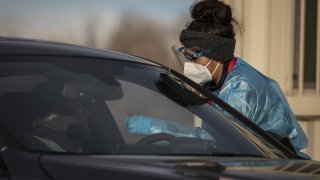
- There were more than 1 million new U.S. Covid-19 cases on Monday, a single-day record, according to Johns Hopkins University data.
- Americans who get Covid and miss work aren't eligible for unemployment benefits. That wasn't the case earlier in the pandemic due to the Pandemic Unemployment Assistance program.
- However, the same may not be true for people exposed (but not infected with) the virus.
Covid-19 infections are ballooning, and sick Americans who miss work due to the virus may wonder if they qualify for unemployment benefits.
The short answer: They don't.
There were more than 1 million new U.S. Covid cases reported Monday, a single-day record, according to data compiled by Johns Hopkins University. The seven-day average of daily new cases is over 480,000.
Get Southern California news, weather forecasts and entertainment stories to your inbox. Sign up for NBC LA newsletters.
The dramatic rise in caseloads, fueled by the highly contagious omicron and delta virus strains, is causing worker shortages and disrupting businesses. The Centers for Disease Control and Prevention recently shortened the Covid isolation period to five days for people without symptoms, down from 10 days.
Individuals who test positive for Covid-19 and stay home to recover and isolate from others aren't eligible for jobless benefits, according to Michele Evermore, a senior policy advisor for unemployment insurance at the U.S. Department of Labor.
Unemployment benefits are a type of social insurance paid on a weekly basis. The law requires Americans to be "able and available" for work to qualify for the assistance.
Money Report
An individual who has Covid-19 doesn't meet this core requirement, Evermore said.
"[Unemployment insurance] is not intended to be used as paid sick leave," the Labor Department wrote to state workforce agencies, which administer benefits, in March 2020.
Not always the case
This wasn't always the case during the pandemic. The CARES Act relief law created a temporary unemployment program offering jobless aid to sick individuals and others (like gig workers) who typically don't qualify for unemployment insurance.
The federal program, Pandemic Unemployment Assistance, expired on Labor Day. (Many Republican-led states opted out of the program early, in June or July.)
More from Personal Finance:
Elizabeth Holmes verdict offers lessons for investors
When auto insurance is most and least expensive
When it makes sense to sell stocks
While those who test positive for Covid-19 no longer qualify for jobless benefits, that's not necessarily true of people who isolate due to a potential Covid exposure and must miss work, Evermore said.
They may be eligible because they're technically able and available to work, she said.
For example: Someone with an outdoor job (perhaps a lumberjack or construction worker) who must quarantine due to potential Covid exposure can technically do a few weeks of online work while they isolate. They can work, just not their customary job.
"An individual may be quarantined or otherwise affected by Covid-19 but still eligible for [unemployment compensation], depending on state law," according to the Labor Department memo.
Americans with Covid-19 may get paid sick leave through their workplace, in which case they wouldn't need unemployment benefits.
However, temporary federal laws that increased the availability of paid leave earlier in the pandemic have expired. (One required certain businesses to offer paid sick leave, but expired at the end of 2020; another offered tax credits to employers to reimburse them for the cost of offering leave, but expired Sept. 30.)






